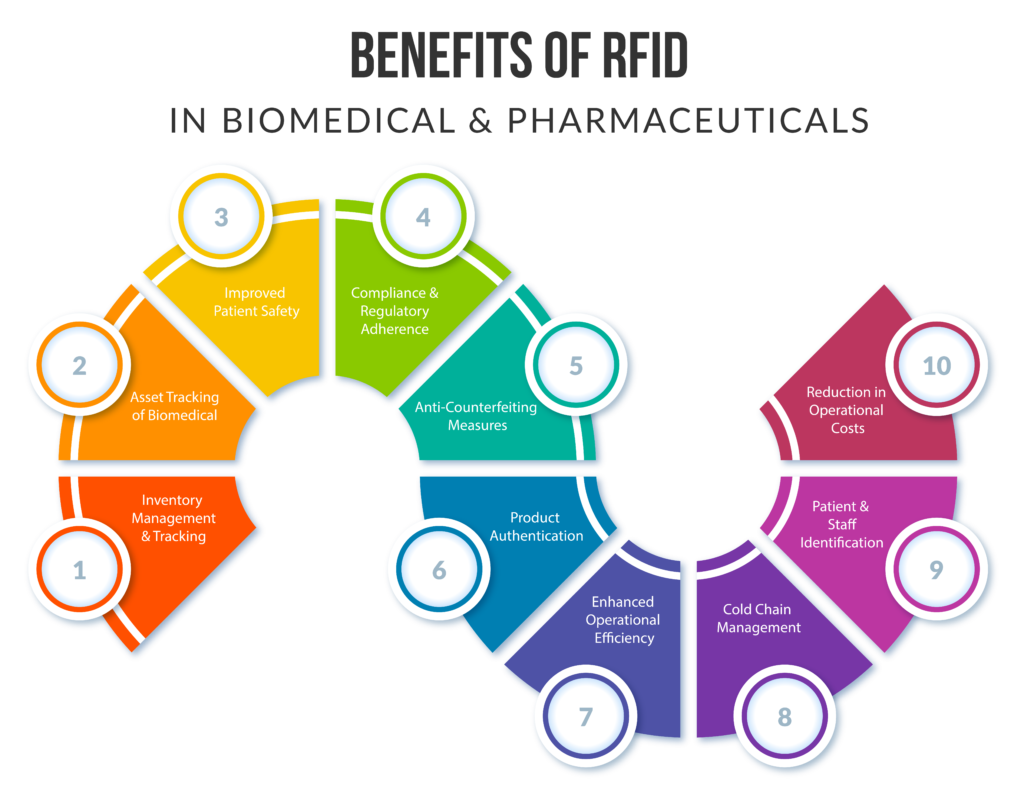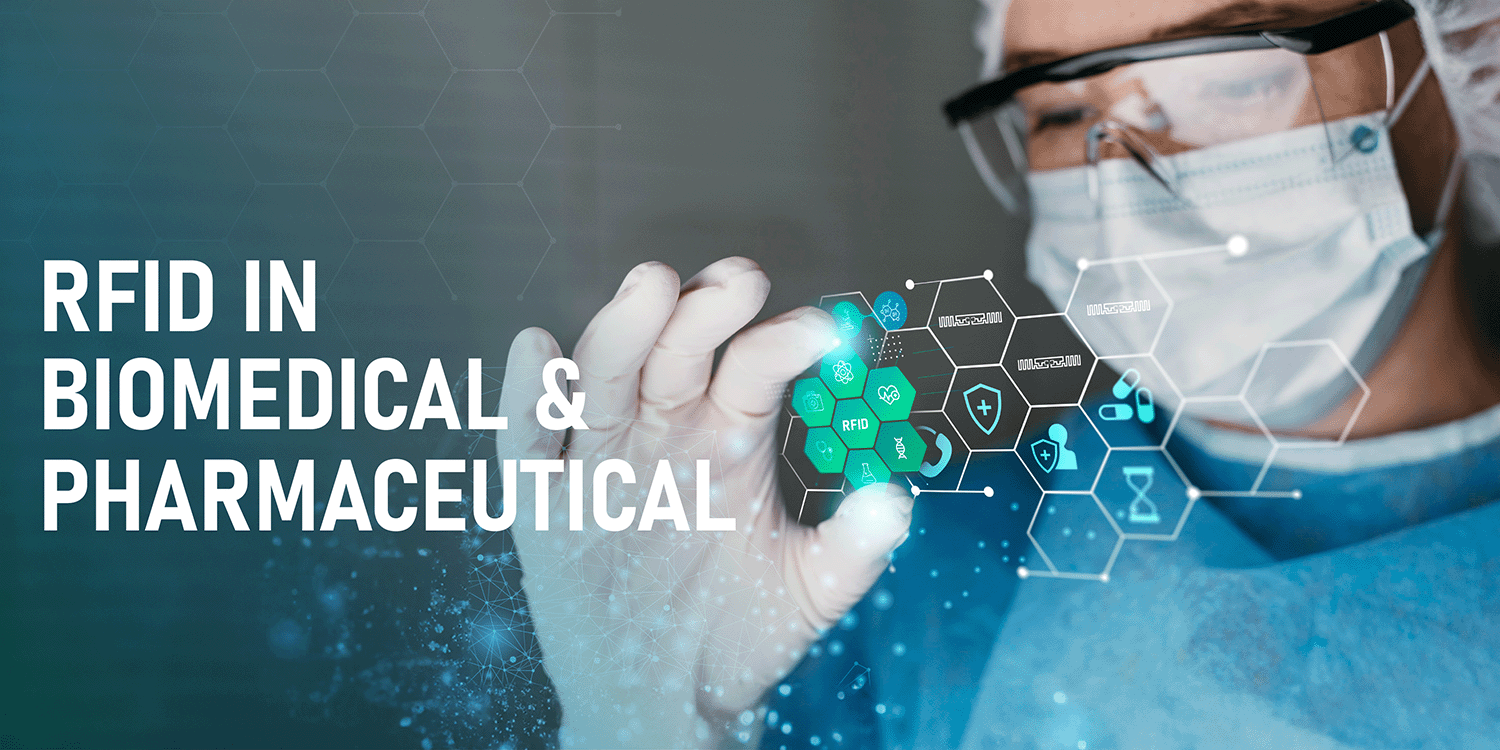Introduction
Radio Frequency Identification (RFID) technology has emerged as a game-changer in various industries, with the biomedical and pharmaceutical sectors being at the forefront of its adoption. This article explores the multifaceted applications, benefits, challenges, and future prospects of RFID technology in these critical industries.
RFID technology is used in biomedical and pharmaceutical fields.
RFID is a wireless technology that uses radio waves to identify and track objects.
An RFID system typically consists of three components:
RFID Tag: An RFID Tag is a small chip with an antenna that stores and transmits data.
RFID Reader: An RFID Reader that emits radio waves and receives signals from the RFID tag.
RFID Software: RFID Software that processes and manages the data collected by the RFID reader.
RFID tags can be passive (powered by the reader’s radio waves), active (battery-powered), or semi-passive (battery-assisted). The choice depends on the specific application requirements.
Applications in the Biomedical Field
Asset Tracking and Management of Equipment
- Equipment tracking in hospitals and laboratories
- Monitoring usage patterns and maintenance schedules
- Reducing equipment loss and optimizing inventory
Specimen and Sample Management
- Tracking biological samples in research laboratories.
- Ensuring proper handling and storage conditions.
- Maintaining chain of custody for forensic samples.
Blood Bank Management
- Tracking blood products from donation to transfusion
- Ensuring proper storage conditions and expiration dates
- Preventing errors in blood type matching
Surgical Instrument Tracking
- Monitoring sterilization processes
- Ensuring all instruments are accounted for before and after surgeries
- Tracking usage history for maintenance and replacement through Asset Tracking RFID Software.
Applications in the Pharmaceutical Industry
Supply Chain Management
- Track and trace pharmaceuticals from manufacturer to patient
- Combating counterfeit drugs
- Managing recalls efficiently
Inventory Management
- Real-time inventory tracking of different medical devices and medicines.
- Automated reordering systems
- Optimizing stock levels and reducing waste
Clinical Trials
- Managing drug dispensing and returns
- Ensuring data integrity and regulatory compliance
Temperature Monitoring
- Ensuring proper storage conditions for temperature-sensitive drugs
- Monitoring cold chain logistics with temperature RFID tags.
- Automatically documenting temperature excursions
Manufacturing Process Control
- Tracking raw materials and finished products
- Ensuring Good Manufacturing Practices (GMP) compliance
- Automating batch record-keeping of medicines and medical items.

Benefits of RFID in Biomedical and Pharmaceutical Sectors
- Enhanced patient safety through accurate identification and medication administration
- Improved inventory management and reduced costs
- Increased operational efficiency and productivity
- Better compliance with regulatory requirements
- Enhanced data accuracy and real-time visibility
- improved product authentication and anti-counterfeiting measures
- Streamlined recall processes
- Optimized asset utilization and maintenance
Challenges and limitations in the biomedical and pharmaceutical sectors
- Initial implementation costs of the RFID ecosystem.
- Integration with existing systems and processes
- Data security and privacy concerns.
- Interference issues in certain environments (e.g., around metal or liquids)
- Standardization challenges across the biomedical and pharmaceutical industry
- Resistance to change from staff and stakeholders.
- Potential for tag detachment or damage.
- Reading accuracy in challenging environments (e.g., high moisture content)
Future Trends and Developments in the Biomedical and Pharmaceutical Sectors
- Integration with the Internet of Things (IoT) and Artificial Intelligence (AI)
- Development of smaller, more durable, and cost-effective tags
- Enhanced data analytics for predictive maintenance and inventory optimization
- Increased use of RFID in personalized medicine and drug delivery systems
- Expansion of RFID use in remote patient monitoring and telemedicine
- Advancements in RFID-enabled smart packaging
- Integration with blockchain technology for enhanced traceability and security
Regulatory considerations in the biomedical and pharmaceutical sectors
- FDA regulations on RFID use in pharmaceutical tracking
- HIPAA compliance for patient data protection
- International standards for RFID in healthcare (e.g., ISO/IEC 18000 series)
Conclusion
RFID technology has proven to be a valuable tool in the biomedical and pharmaceutical industries, offering significant improvements in efficiency, safety, and compliance. As the technology continues to evolve and integrate with other emerging technologies, its potential applications and benefits are likely to expand further. However, careful consideration of challenges, limitations, and regulatory requirements is essential for the successful implementation and ongoing use of RFID systems in these critical sectors.
